In the rapidly evolving digital age, cybersecurity has become a growing concern for schools, organizations, and governments. With the increasing reliance on technology, schools are becoming frequent targets of cyberattacks, which can disrupt educational systems and put sensitive data at risk. In response to these threats, Google has introduced a robust solution in the form of enterprise-grade Chromebooks, which provide an additional layer of security designed to protect against digital assaults.
Here's ads banner inside a post

This article explores how Chromebooks, particularly those deployed in educational settings, have emerged as a powerful tool in safeguarding institutions against cybersecurity risks. From multi-layered protection to Zero Trust security frameworks, these devices are at the forefront of ensuring that schools remain secure in an increasingly connected world.

Here's ads banner inside a post
The Growing Threat to Schools
In recent years, schools have become prime targets for a variety of cyberattacks, including ransomware, phishing, malware, and data breaches. According to cybersecurity experts, such attacks often originate from malicious emails, which can easily bypass outdated security systems. In 2023 alone, the U.S. saw a significant increase in ransomware attacks on K-12 schools, with many institutions falling victim to sophisticated phishing schemes.
Jeremy Burnett, vice president of technology at CTL, a Chromebook manufacturer and partner of Google, explained, “Schools have become frequent targets for cyberattacks like ransomware, phishing, and malware.” Burnett’s company provides tailored Chromebook solutions for educational institutions and works closely with Google to enhance the security of these devices.

Here's ads banner inside a post
The statistics are staggering. On average, U.S. schools lose around $500,000 per day in downtime during ransomware attacks. These attacks not only disrupt daily operations but also jeopardize student and faculty data, which can have lasting consequences on an institution’s reputation and operations.
Chromebooks: A Secure Computing Edge for Schools
At the heart of Google’s solution is the Chromebook, a device running ChromeOS, an operating system designed with security as its foundation. These devices, which range from consumer-grade models to enterprise-level configurations, provide what Google calls “defense in depth,” a strategy that offers multiple layers of protection to thwart cybercriminals.

For schools that deploy Chromebooks across their networks, this multi-layered security system is enhanced with additional features designed specifically for enterprise use. One of the key features is Zero Trust security, a framework that verifies the identity of every user and device before granting access to sensitive systems or data. Zero Trust ensures that no device, user, or network is automatically trusted, and each access request must be authenticated, even if it originates from within the organization’s network.

How Chromebooks Keep Schools Safe
Chromebooks come equipped with several built-in features that significantly enhance their security. These include automatic updates, Verified Boot, and data loss prevention (DLP) mechanisms, among others.
Automatic Updates
One of the standout features of Chromebooks is their ability to automatically update the operating system in the background, without interrupting the user experience. Andrew Luong, partner success engineer for Google and ChromeOS, emphasizes that ChromeOS updates automatically, which is a significant benefit for educational institutions. With the increasing complexity of cyber threats, it is essential to ensure that devices are always running the latest security patches. Manual updates often fail due to human error, but automatic updates ensure that devices remain secure with minimal effort from users or IT staff.

The update process happens silently in the background, and when updates are complete, users are prompted to reboot the device, ensuring that they are always using the most secure version of ChromeOS.
Verified Boot and Malware Protection
Chromebooks are equipped with Verified Boot, a security feature that checks the integrity of the operating system during startup. This ensures that the device has not been tampered with or compromised by malware. If the system detects any changes or corruption, it will automatically attempt to repair itself by restoring the OS to its original state.

In addition to Verified Boot, Chromebooks have built-in malware protection. Google’s ChromeOS boasts a strong track record in preventing ransomware attacks, with no such incidents ever reported on ChromeOS devices. This is a testament to the resilience of Chromebooks, particularly in environments like schools, where cybercriminals often target vulnerable systems.
Zero Trust Security Framework
At the enterprise level, Chromebooks are equipped with context-aware signals that check the integrity of the device before granting access to critical applications. This is a key feature in the Zero Trust security model, which ensures that every access request is authenticated and verified. By combining these features, schools can create a more robust cybersecurity framework that protects against both internal and external threats.
Centralized Management
For schools and educational institutions, managing large fleets of Chromebooks is made easier through the IT administration console. This console allows administrators to configure devices, monitor security events, and ensure that updates are installed and applied correctly. By providing a centralized management interface, Google simplifies the task of keeping Chromebooks secure and compliant with institutional security policies.
Insider Risks: The Human Element in Cybersecurity
While Chromebooks offer advanced technical security features, cybersecurity is ultimately a combination of technology and human behavior. As Luong points out, a significant portion of data breaches in schools is caused by human error. In fact, about 90% of breaches in K-12 schools result from employees clicking on phishing links, which can lead to devastating consequences, such as ransomware attacks.
To mitigate this risk, cybersecurity training is essential. Many schools struggle with the challenge of educating staff and students on safe online practices. Cybersecurity awareness programs, such as those offered by CyberNut, help institutions teach employees how to identify phishing attempts, use strong passwords, and follow best practices for digital safety.

CyberNut’s CEO, Oliver Page, highlights the importance of ongoing training to foster lasting behavior changes. “The real objective is to allow schools to measure behavior change, not just check a box,” he said. By providing engaging, gamified training experiences, CyberNut aims to ensure that staff members understand the risks they face and how to mitigate them.
The High Cost of Cyberattacks
The financial cost of cyberattacks on schools can be staggering. The median ransom payment for a successful ransomware attack last year was $6.5 million, not including the recovery and downtime costs that schools must bear. With thousands of devices to manage and sensitive data to protect, many schools simply cannot afford to ignore cybersecurity threats.
The lack of a dedicated cybersecurity budget in many educational institutions exacerbates the problem. Schools often have limited resources, which leads to insufficient staffing and a lack of expertise in managing and securing their digital infrastructure. As a result, Chromebooks, with their built-in security features and centralized management tools, represent a cost-effective solution for schools looking to bolster their cybersecurity defenses.
The Future of Cybersecurity in Education: Chromebooks Leading the Way
As the digital landscape continues to evolve, so too do the threats faced by educational institutions. Ransomware, phishing, and other cyberattacks are becoming increasingly sophisticated, putting schools at greater risk of disruption and data loss. However, Chromebooks, with their multi-layered security features, Zero Trust framework, and automatic updates, offer a powerful tool to help schools secure their digital environments. By combining cutting-edge technology with ongoing cybersecurity training, schools can safeguard their networks and protect the sensitive data of students, faculty, and staff.
In a world where cyber threats are ever-present, Chromebooks provide a much-needed solution to ensure that schools can focus on what matters most: educating the next generation without the constant worry of digital assaults.


